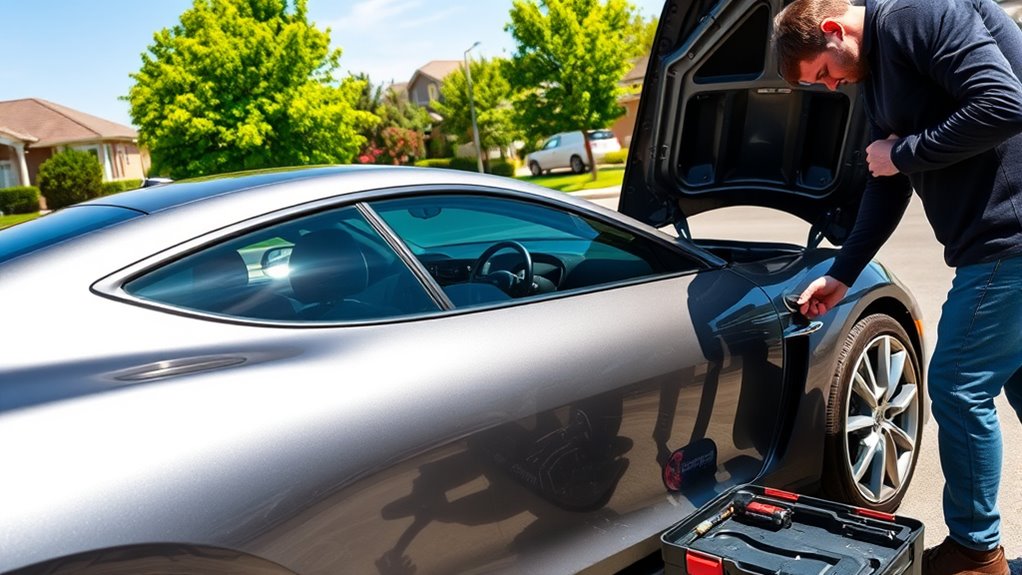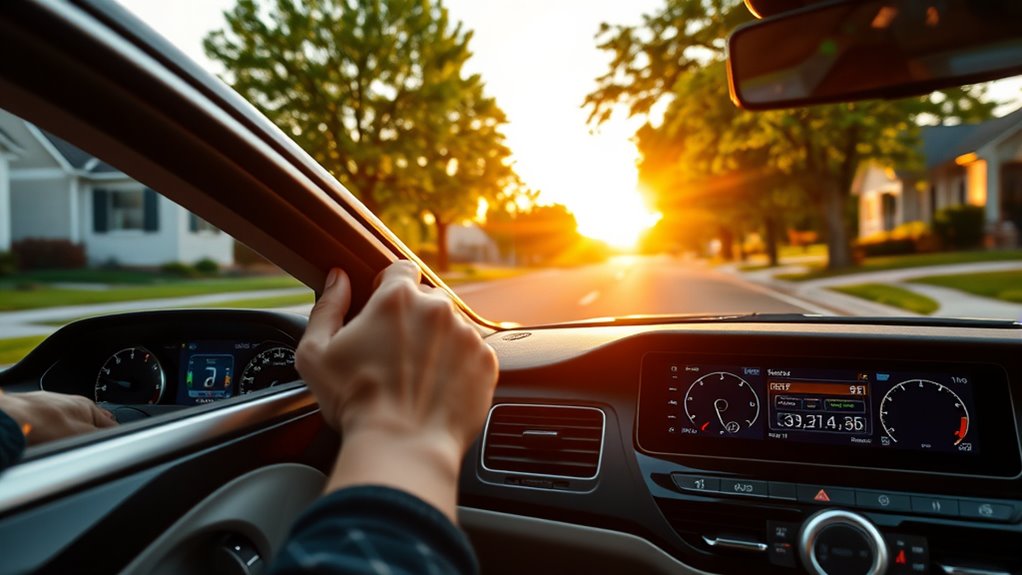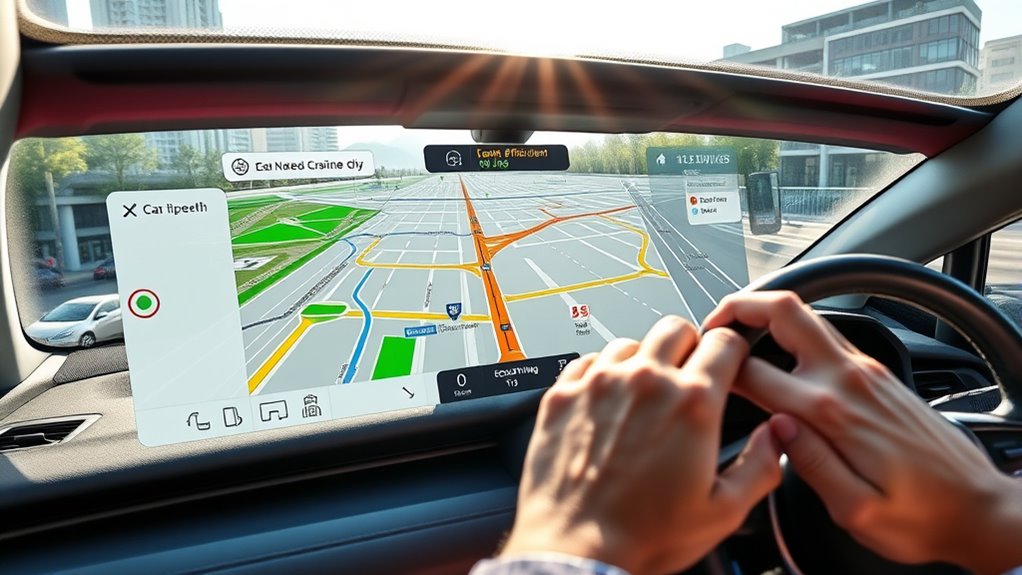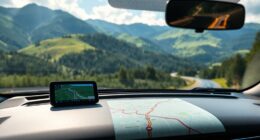To save fuel, keep your vehicle well-maintained by checking tire pressure, replacing air filters, and scheduling regular tune-ups. Adopt smooth driving habits like steady speeds, gentle acceleration, and anticipating traffic to brake less. Optimize your routes using GPS to avoid congestion and plan trips during off-peak hours. Staying on top of vehicle care and smart driving practices can make a big difference—continue exploring these proven tips to maximize your savings.
Key Takeaways
- Maintain proper tire pressure to reduce rolling resistance and improve fuel efficiency.
- Drive steadily, avoiding rapid acceleration, hard braking, and unnecessary idling.
- Plan and combine trips to minimize total driving distance and avoid traffic delays.
- Keep your vehicle well-maintained with regular tune-ups, air filter, and spark plug replacements.
- Remove roof racks or carriers when not in use to enhance aerodynamics and save fuel.
Keep Your Vehicle Well-Maintained

Regular vehicle maintenance is crucial for maximizing fuel efficiency. One of the simplest ways to do this is by following tire pressure tips—keeping your tires properly inflated reduces rolling resistance and improves mileage. Check your tire pressure regularly, especially before long trips, and ensure it matches your vehicle’s recommended PSI. Additionally, engine tune-ups are essential; a well-maintained engine runs more smoothly and uses fuel more efficiently. Regularly replace air filters and spark plugs, and address any engine issues promptly. Proper calibration of your vehicle’s systems can further optimize fuel consumption. Ensuring your vehicle’s performance is at its best can also contribute to better fuel economy. Using advanced diagnostics tools can help identify hidden issues that affect fuel efficiency. Staying on top of maintenance prevents unnecessary fuel consumption and keeps your car running reliably for miles to come. Routine checks of your vehicle’s maintenance history can also help catch potential problems early, saving you money and improving longevity. Additionally, staying aware of recommended service intervals ensures all critical components are functioning optimally for fuel savings.
Adopt Driving Habits That Save Fuel

Adopting fuel-efficient driving habits can substantially reduce your fuel consumption over time. Start by maintaining steady speeds and avoiding rapid accelerations or hard braking, which waste fuel. Keep your tires, especially eco friendly tires, properly inflated to reduce rolling resistance. An aerodynamic design also plays a key role; remove roof racks or carriers when not in use to improve airflow around your vehicle. Practice gentle acceleration and deceleration to minimize engine strain. Anticipate traffic flow to avoid unnecessary stops. Additionally, using headphones can help you stay focused and reduce distractions while driving, promoting safer and more efficient driving habits. Being aware of cultural heritage and upbringing can influence your attitude towards eco-friendly practices and enhance your motivation to adopt sustainable habits. Incorporating fuel-saving tips from trusted sources can further optimize your driving efficiency. Regular vehicle maintenance ensures your car operates at peak performance, leading to better fuel economy. By staying informed about automotive technology, you can take advantage of the latest innovations that improve fuel efficiency. These habits not only save fuel but also extend your vehicle’s lifespan. Consistently applying them makes your driving more eco-friendly and cost-effective, helping you get the most out of every gallon.
Optimize Your Routes and Travel Times

Planning your routes and travel times carefully can considerably cut down on unnecessary fuel use. Use GPS navigation apps to find the quickest routes and avoid traffic jams. Timing your trips during off-peak hours helps you steer clear of congestion, saving fuel and reducing emissions. Consider combining errands into one trip to minimize total driving. Here’s a quick guide:
| Strategy | Benefit | Tools Needed |
|---|---|---|
| Check traffic timing | Avoid delays, save fuel | Traffic apps, GPS |
| Use GPS navigation | Find ideal routes | Smartphone, GPS device |
| Schedule trips wisely | Travel during off-peak hours | Calendar, traffic data |
| Plan errands efficiently | Reduce total driving time | List of stops |
Additionally, planning your trips can help you avoid excessive idling, which wastes fuel and increases emissions. Being mindful of traffic congestion and adjusting your plans accordingly can further optimize your travel efficiency. Incorporating real-time traffic updates can further optimize your travel plans and contribute to fuel efficiency. Regularly inspecting your vehicle’s maintenance needs, such as ensuring proper tire inflation and engine health, can also significantly improve fuel economy.
Frequently Asked Questions
How Does Tire Pressure Directly Impact Fuel Efficiency?
Proper tire pressure directly impacts your fuel efficiency. When your tires aren’t properly inflated, your engine works harder to move the vehicle, wasting fuel. Regular tire pressure maintenance ensures your tires stay at ideal inflation levels, reducing rolling resistance. Follow best inflation strategies by checking your tire pressure frequently and maintaining it according to your vehicle’s specifications. This simple step can improve fuel economy and extend tire life, saving you money in the long run.
What Are the Best Times to Avoid Traffic for Fuel Saving?
They say, “Time is money,” and it holds true for saving fuel. To avoid traffic, plan your route to steer clear of peak hour travel, typically mornings and late afternoons. Use route planning apps to find the fastest, least congested roads. Traveling during off-peak hours reduces idling and stop-and-go driving, which saves fuel. Being strategic with your timing helps you conserve fuel and makes your drive smoother.
Can Using Cruise Control Significantly Improve Fuel Economy?
Using cruise control can considerably improve your fuel economy, especially on highways. It helps maintain a steady speed, reducing unnecessary acceleration and braking. Incorporate eco driving techniques like smooth acceleration and deceleration. Additionally, keep up with maintenance tips, such as regular tire checks and engine tune-ups, to guarantee peak efficiency. By combining cruise control with good driving habits and proper vehicle maintenance, you’ll save fuel and extend your vehicle’s lifespan.
How Does Vehicle Weight Affect Fuel Consumption?
Imagine you’re back in the days of horse-drawn carriages—today, vehicle weight still matters. Heavier vehicles require more power to move, which means your fuel economy drops. When your car’s weight increases, your engine works harder, consuming more fuel. To save fuel, keep your vehicle as light as possible by removing unnecessary items. Lighter vehicles improve fuel economy, helping you go farther on less fuel every time you hit the road.
Are There Specific Fuel Types That Save More Money?
You might find that choosing the right fuel type can save you money. Ethanol blends, like E10, often cost less and are widely available, but they may slightly reduce fuel efficiency. Some fuel additives claim to improve mileage, but evidence varies. Always check your vehicle’s recommendations to guarantee compatibility. By selecting cost-effective fuels and using approved additives, you can maximize savings without harming your engine.
Conclusion
By following these fuel-saving hacks, you could turn your car into a superhero of efficiency, saving gallons of fuel and shrinking your carbon footprint like a magic trick. Imagine cruising past gas stations, leaving expensive fuel bills in your rearview mirror, while your wallet grows heavier with savings. With just a few simple tricks, you’ll transform every drive into a powerful, eco-friendly adventure—making your car the ultimate fuel-saving machine that leaves waste and wastefulness in the dust!









